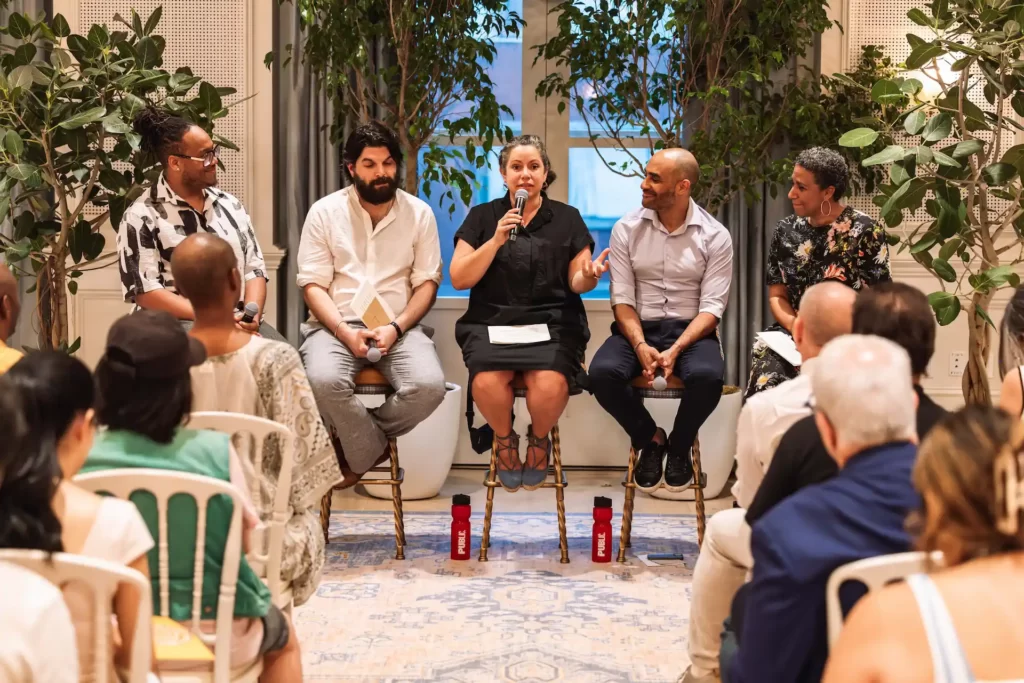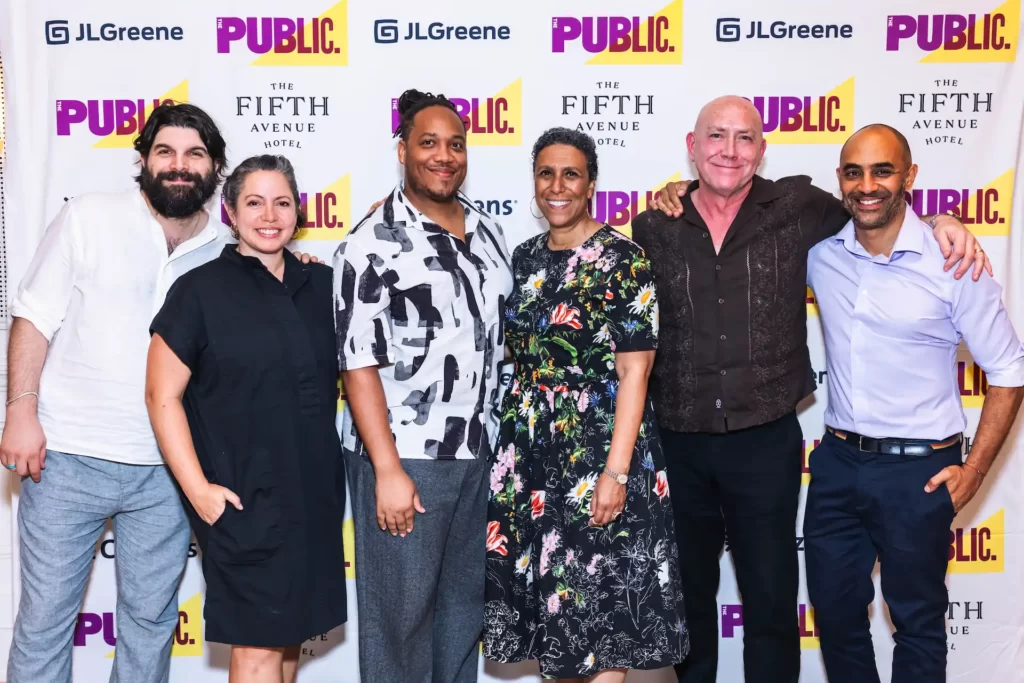
Key Learnings from Recontextualizing Shakespeare
Explore five takeaways from a thought-provoking evening on adapting the Bard for today, in partnership with The Public Theater.
On July 8th, The Public Theater and The Fifth Avenue Hotel co-hosted Recontextualizing Shakespeare, an evening of cocktails and conversation ahead of the reopening of The Delacorte Theater and this summer’s Free Shakespeare in the Park production of Twelfth Night. Set in The Grand Salon, the conversation featured Twelfth Night director Saheem Ali, Mobile Unit’s Much Ado About Nothing adaptors Rebecca Martínez and Julián Mesri, and Pericles adaptor Troy Anthony, moderated by acclaimed scholar Professor Ayanna Thompson.

The discussion explored Shakespeare as a living, flexible form, one that can be reimagined through culture, language, music, and community. From questions of access and authorship to the role of joy and translation, the evening reaffirmed the shared belief that Shakespeare endures not through preservation but through bold, inclusive reinvention.
Discover our highlights from the conversation:
1. Shakespeare Is Most Powerful When It Sounds Like You
For many artists, the traditional delivery of Shakespeare (think formal, British, and elite) can feel disconnected from their lived experiences. With that in mind, the evening began with a deeply personal reflection from Saheem Ali, Associate Artistic Director of The Public Theater and director of this summer’s Twelfth Night.
He recounted his first encounter with Shakespeare in Nairobi, Kenya, as a teenager in an all-Black and Brown cast of Romeo and Juliet: “We were all Black and Brown Kenyan kids doing Shakespeare and sounding like ourselves… I didn’t know how radical and revolutionary that was until I came to America.”
His story underscored a central idea: when Shakespeare is rooted in authenticity, rather than imitation, it becomes far more impactful and inclusive.
2. You Don’t Need Permission to Make It Yours
Shakespeare can feel exclusive until someone opens the door, and then everything changes. For Rebecca Martínez, that invitation came through The Public Theater. Before that, she described feeling like Shakespeare was “not for her,” a tightly guarded tradition with rigid rules. But joining The Public Theater’s Mobile Unit reframed everything: “When I got that invitation, and I realized, oh, I can make something that is for me, from my voice… we don’t have to apologize or try to be something else.”
That shift, from feeling like an outsider to claiming full authorship, has shaped how Martínez approaches every project. Her work with the Mobile Unit, which brings theater into parks, shelters, and correctional facilities across New York City, is grounded in the belief that art should meet people where they are.
3. Language and Music Are Powerful Access Points
When Shakespeare is performed in translation or adapted into music, it becomes newly accessible to communities who may have never seen themselves in his work. Speaking about his Spanish-language adaptation of Much Ado About Nothing, Julián Mesri explained how translation becomes a tool for inclusion: “By making it in Spanish and solving those problems in Spanish, suddenly people realized — this can belong to me, too.”
His work addresses not just language, but cultural nuance. Characters like Dogberry, whose humor usually falls flat in traditional productions, were reimagined for multilingual audiences with wit and clarity. “Dogberry never works. But when we had him speak in broken Spanish, suddenly the audience was roaring. Because they got it,” Mesri recounts. The result? Laughter, recognition, and belonging.
Similarly, Troy Anthony described his gospel adaptation of Pericles as an opportunity to infuse Shakespeare with the sounds and spirituality of the Black church: “Shakespeare is like tofu — it really takes on the flavor of what it goes around.”
Translation, whether linguistic or musical, is just as much about connection as it is about comprehension.
4. Joy Is A Radical Act
During the conversation, one theme surfaced again and again: the power of joy. For Rebecca Martínez, joy isn’t just the byproduct of a performance; it’s also an intentional practice. “Practicing joy is a radical act… Every mobile stop is a chance to build a village — a mini community — and invite people in,” she says.
Martínez emphasized that joy becomes a tool for connection, especially in areas that are overlooked and underserved. The act of gathering, no matter where that may be, and finding delight in a shared story is, in itself, a disruption of the status quo.
Whether through music, language, or humor, each artist spoke to the importance of making space for joy as a force that restores agency, deepens empathy, and invites everyone in.
5. To Reach Gen Z, Invite Them In
The conversation closed with a look toward the future: how do you make Shakespeare matter for younger audiences, especially Gen Z? For these artists, the answer lies in collaboration, not simplification.
Martínez described bringing younger performers and creative voices into the room early, and allowing them to shape the characters, language, music, and movement: “If I want Gen Z folks in the audience to be engaged, I’m going to bring Gen Z in the room, and I will listen. I will let them bring their creative ideas to the space.”
Julián added, “We think about access in terms of theatre, you just want to create as many entrance points for someone to have. Maybe it’s the language. Maybe it’s the costumes. Maybe it’s the music. In this Gen Z era of TikTok, people are looking for different forms of entrance.”

When young audiences see themselves reflected in the people and energy onstage, they respond with curiosity, delight, and ownership.
Photos by Rebecca J Michelson.

